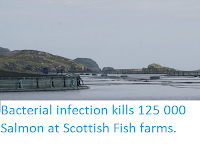Shops across Europe are withdrawing frozen vegetables from their shelves after an outbreak of Listeria poisoning was traced to a processing plant in Hungary. Forty seven cases of the illness have been reported across Europe, with nine fatalities, in Austria, Denmark, Finland and the United Kingdom. The infection was initially thought to be confined to Corn products from the plant, but has now been found in a range of other vegetables, and now all products produced at the plant between August 2016 and June 2018 (when the plant was closed down by local authorities) considered to be a risk.
Listeria monocytogenes is a facultative
anaerobic Bacterium (Bacterium that does not need oxygen to survive,
but which is not poisoned by it either) that is one of the most common
causes of food-poisoning in Humans, causing an estimated 1600 infections
and 260 fatalities in the US each year. It is a form of Firmicutes,
tough cell-walled Bacteria that produce endospores capable of surviving
desiccation and other extreme conditions, making the Bacteria very hard
to eradicate.
Electron micrograph of a flagellated Listeria monocytogenes Bacterium, Magnified 41 250 times. Centers for Disease Control and Prevention/Wikipedia.
Listeria monocytogenes is
particularly associated with unpasteurised dairy products (such as raw
milk cheeses), as it is primarily an infection of Ruminant Mammals. It
can cause meningitis-type infections in Humans, and is particularly
dangerous to the very old, very young and those with compromised immune
systems. However it can also thrive in Human gastrointestinal tracts
without harming the host (it is estimated that about 10% of people are
infected) raising the possibility of direst Human-to-Human transmission.
See also...
Follow Sciency Thoughts on Facebook.







